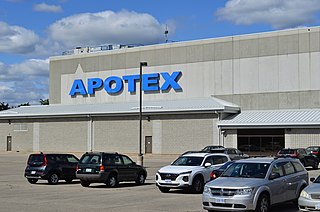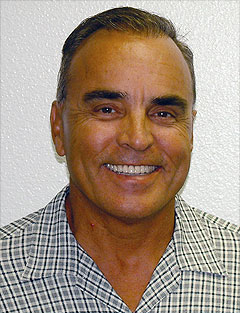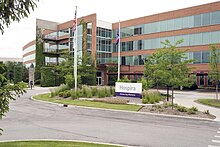
Sodium thiopental, also known as Sodium Pentothal, thiopental, thiopentone, or Trapanal, is a rapid-onset short-acting barbiturate general anesthetic. It is the thiobarbiturate analog of pentobarbital, and an analog of thiobarbital. Sodium thiopental was a core medicine in the World Health Organization's List of Essential Medicines, but was supplanted by propofol. Despite this, thiopental is listed as an acceptable alternative to propofol, depending on local availability and cost of these agents. It was previously the first of three drugs administered during most lethal injections in the United States, but the US manufacturer Hospira stopped manufacturing the drug in 2011 and the European Union banned the export of the drug for this purpose. Although thiopental abuse carries a dependency risk, its recreational use is rare.

Valproate (VPA) and its valproic acid, sodium valproate, and valproate semisodium forms are medications primarily used to treat epilepsy and bipolar disorder and prevent migraine headaches. They are useful for the prevention of seizures in those with absence seizures, partial seizures, and generalized seizures. They can be given intravenously or by mouth, and the tablet forms exist in both long- and short-acting formulations.

Lethal injection is the practice of injecting one or more drugs into a person for the express purpose of causing rapid death. The main application for this procedure is capital punishment, but the term may also be applied in a broader sense to include euthanasia and other forms of suicide. The drugs cause the person to become unconscious, stops their breathing, and causes a heart arrhythmia, in that order.
An epinephrine autoinjector is a medical device for injecting a measured dose or doses of epinephrine (adrenaline) by means of autoinjector technology. It is most often used for the treatment of anaphylaxis. The first epinephrine autoinjector was brought to market in 1983.
Abbott Laboratories is an American multinational medical devices and health care company with headquarters in Abbott Park, Illinois, United States. The company was founded by Chicago physician Wallace Calvin Abbott in 1888 to formulate known drugs; today, it sells medical devices, diagnostics, branded generic medicines and nutritional products. It split off its research-based pharmaceuticals business into AbbVie in 2013.

Propofol is the active component of an intravenous anesthetic formulation used for induction and maintenance of general anesthesia. It is chemically termed 2,6-diisopropylphenol. The formulation was originally approved under the brand name Diprivan. Numerous generic offerings of this formulation now exist. Intravenous administration is used to induce unconsciousness after which anesthesia may be maintained using a combination of medications. It is manufactured as part of a sterile injectable emulsion formulation using soybean oil and lecithin, giving it a white milky coloration.
Pentobarbital is a short-acting barbiturate typically used as a sedative, a preanesthetic, and to control convulsions in emergencies. It can also be used for short-term treatment of insomnia but has been largely replaced by the benzodiazepine family of drugs.
Mylan N.V. was a global generic and specialty pharmaceuticals company. In November 2020, Mylan merged with Upjohn, Pfizer's off-patent medicine division, to form Viatris. Previously, the company was domiciled in the Netherlands, with principal executive offices in Hatfield, Hertfordshire, UK and a "Global Center" in Canonsburg, Pennsylvania, US.

Apotex Inc. is a Canadian pharmaceutical corporation. Founded in 1974 by Barry Sherman, the company is the largest producer of generic drugs in Canada, with annual sales exceeding CA$2.5 billion. By 2023, Apotex employed close to 8,000 people as Canada's largest drug manufacturer, with over 300 products selling in over 115 countries. Apotex manufactures and distributes generic medications for a range of diseases and health conditions that include cancer, diabetes, high cholesterol, glaucoma, infections and blood pressure.
Aflibercept, sold under the brand names Eylea among others, is a medication used to treat wet macular degeneration and metastatic colorectal cancer. It was developed by Regeneron Pharmaceuticals and is approved in the United States and the European Union.
The carpuject is a syringe device for the administration of injectable fluid medication. It was patented by the Sterling Drug Company, which became the Sterling Winthrop, after World War II. It is designed with a luer-lock device to accept a sterile hypodermic needle or to be linked directly to intravenous tubing line. The product can deliver an intravenous or intramuscular injection by means of a holder which attaches to the barrel and plunger to the barrel plug. Medication is prefilled into the syringe barrel. When the plug at the end of the barrel is advanced to the head of the barrel it discharges and releases the contents through the needle or into the lumen of the tubing.
ICU Medical, Inc. is a San Clemente, California-based company with global operations. ICU Medical products are designed to prevent bloodstream infections and protect healthcare workers from exposure to infectious diseases or hazardous drugs. ICU Medical product line includes intravenous therapy (IV) products, pumps, needle-free vascular access devices, custom infusion sets, closed system hazardous drug handling devices and systems, sensor catheters, needle-free closed blood sampling systems, and hemodynamic monitoring systems.
The execution of Jeffrey Timothy Landrigan, who had been convicted of murder in the state of Arizona, was carried out on October 26, 2010 by lethal injection.

George "Doc" Lopez is the founder and former chief executive officer and chairman of the board of ICU Medical, Inc. and a noted freediver and spearfisherman who has held several world and U.S. records in both sports.
Allergan plc is an American, Irish-domiciled pharmaceutical company that acquires, develops, manufactures and markets brand name drugs and medical devices in the areas of medical aesthetics, eye care, central nervous system, and gastroenterology. The company is the maker of Botox.

A euthanasia solution is a drug-containing aqueous solution for intentionally ending life to either relieve pain and suffering or execute convicts. The drugs used in euthanasia solution do not only need to be safe to personnel, but they also need to have a rapid onset of action and minimize the possible pain felt by humans and animals. To satisfy these requirements, the active ingredients in the euthanasia solution are usually anaesthetics, respiratory depressants, cardiotoxic drugs and cytotoxic drugs.









